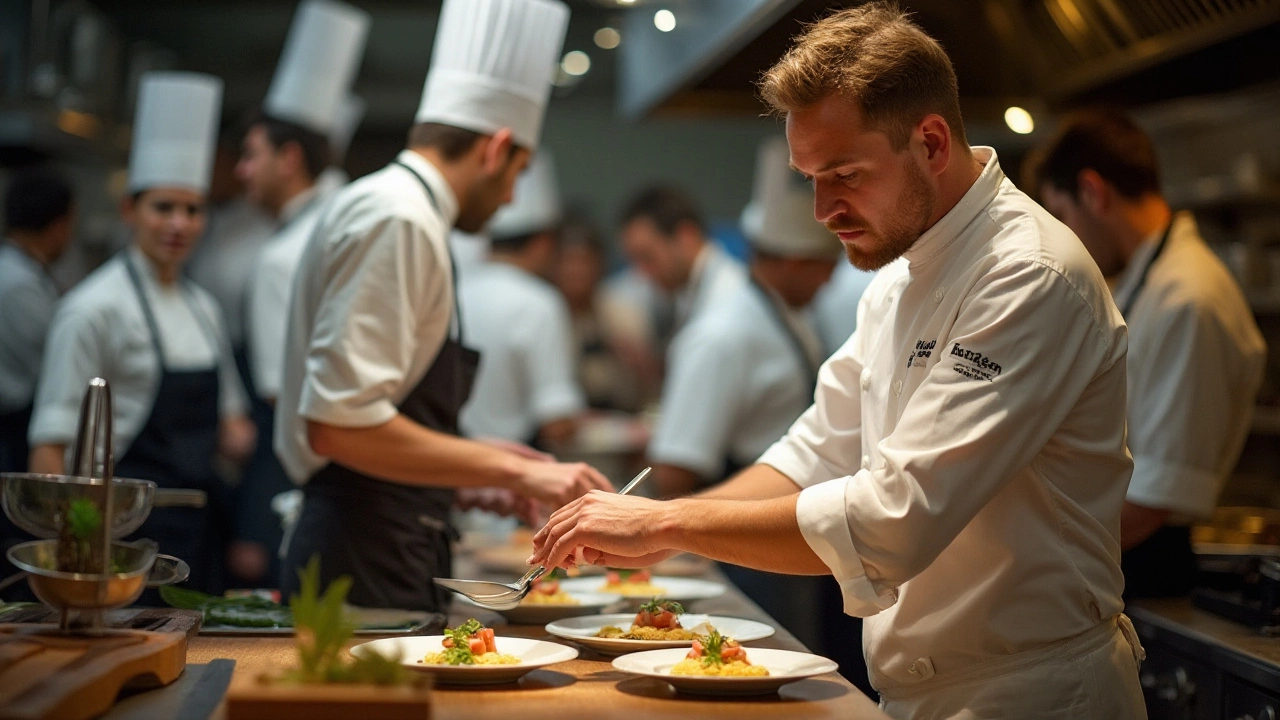Top Earning Culinary Professionals: Unveiling the Most Lucrative Chef Careers
 Dec, 1 2024
Dec, 1 2024
In the vibrant, sizzling world of culinary arts, not all cooks are created equal when it comes to earning potential. Some chefs reign supreme in their culinary kingdoms, with salaries reflecting their expertise and creativity. But how do they reach these mouth-watering figures, and what differentiates a good cook from a high-earning chef?
As we explore the ranks within kitchens across the globe, various roles stand out in terms of financial reward. From the commanding presence of executive chefs to the delicate artistry of pastry masters, each specialty offers a unique path to success. Location and reputation further season wages, as chefs in major cities or with renowned establishments often see their profits soar.
For aspiring chefs, understanding these dynamics is crucial. By focusing on specific skills and selecting the right culinary classes, one can set the stage for a lucrative career in this competitive industry. Let’s dive into the intricacies of what makes certain types of cooks the most prosperous, uncovering insights and strategies to stir ambition in every budding chef.
- Culinary Hierarchies: Climbing the Ladder
- Specialty Chefs: The Masters of Flavor
- Location and Reputation: The Impact on Salaries
- From Classes to Kitchens: Training for Success
- Tips for Aspiring High-Earning Chefs
Culinary Hierarchies: Climbing the Ladder
In the bustling world of professional kitchens, climbing the culinary ladder is both an art and a science. A chef’s journey often begins in a humble role, yet through skill, perseverance, and a sprinkle of opportunity, they can rise to become culinary royalty. The kitchen hierarchy, known as the brigade system, is a structured system that assigns specific duties to each chef, creating an efficient workflow. This system, conceptualized by the legendary French chef Georges Auguste Escoffier, ensures every dish that leaves the kitchen is a masterpiece.
At the foundation of this structure lies the commis chef, a junior member learning the ropes. With dedication and a sharp eye for details, a commis may advance to a chef de partie, or line cook. This position involves managing a specific section of the kitchen, whether it be sautéing or pastry. Here, specialization begins to emerge, and attention to detail becomes crucial as each ingredient is weighed and measured with care.
A step up from there is the sous chef, the right-hand person of the executive chef. The sous chef coordinates the kitchen staff, manages supply and inventory, and often steps in to cook during peak hours. They are the lifeline of the kitchen, balancing managerial duties with hands-on culinary work. In many establishments, the sous chef's role is demanding but highly rewarding, serving as a critical stepping stone toward greater responsibilities.
Ascending to Executive Chef
The pinnacle of kitchen hierarchy is the executive chef, a title that commands respect and comes with its own set of lucrative rewards. These chefs are responsible not just for the menu, but for the kitchen as a whole, from ordering ingredients to hiring staff. According to a survey by the Bureau of Labor Statistics, top executive chefs in major metropolitan areas can earn upwards of $100,000 per year, though this figure can vary depending on the restaurant's prestige and location.
Executive chefs are innovators, constantly experimenting to create dishes that captivate diners. They must meld creativity with business acumen, ensuring that each plate is not only delicious but cost-effective. To rise to this rank, many chefs undergo years of on-the-job training and often hold degrees from renowned culinary schools. A quote by Anthony Bourdain captures the essence of this journey:
"Good food is very often, even most often, simple food."Simplicity is key, but achieving it requires a deep understanding of flavors and techniques honed over many years.
Below is a table illustrating average salaries by role and location:
| Role | Average Salary (USD) | Location |
|---|---|---|
| Executive Chef | 100,000 | New York |
| Sous Chef | 60,000 | Los Angeles |
| Chef de Partie | 45,000 | Chicago |
| Commis Chef | 30,000 | Austin |
Moving through culinary hierarchies requires a blend of talent, persistence, and sometimes a bit of good timing. Success stories often echo the same mantra: taste deeply, experiment boldly, and never forget the fundamentals taught at every stage. With the right mix of ingredients, both in the kitchen and in one's career, the climb can lead to great heights.
Specialty Chefs: The Masters of Flavor
In the expansive universe of the culinary arts, specialty chefs stand as true masters, weaving magic with their unique skills and specialties. These culinary artisans may not necessarily run the kitchen, but they bring an unparalleled depth of expertise that can take dining experiences to extraordinary heights. The culinary world is vast, and within this vastness lies a spectrum of opportunities for those who dedicate themselves to honing a certain craft, whether it be patisserie, butcher art, or blending the bold spices of international cuisines.
Specialty chefs often earn a premium wage due to their focused skill set, which is in high demand. A pastry chef, for instance, is a magician of dough and sugar, transforming basic ingredients into edible art. Their creations not only captivate guests visually but create memorable taste experiences, sometimes making pastries the star of the dining experience. This specialized creativity comes with its rewards; top-tier pastry chefs can demand impressive salaries that reflect their skill and artistry, especially in renowned kitchens.
"Great chefs establish a personal connection with their food, making every taste and texture an intimate expression," shares James Beard, a towering figure in the culinary world.In another realm, butchers, or nose-to-tail specialists, have surged in popularity. With sustainable eating on the rise, today’s consumers crave a deeper understanding of their food origins, propelling the demand for expert butchers who deliver quality cuts with finesse. These chefs showcase a symbiotic relationship with their craft, emphasizing the importance of respecting the whole animal. Such specialization requires an intimate knowledge of textures, flavors, and cooking methods, making these chefs indispensable in gourmet establishments.
Additionally, the world has seen a burgeoning appreciation for ethnic cuisine masters who bring the rich heritage of diverse cultures to the table. Be it the fiery heat of Indian dishes or the nuanced complexity of Japanese sushi, these cooks infuse traditional flavors with modern creativity. Their ability to present authentic yet innovative dishes makes them highly valued, often leading to lucrative positions anywhere from bustling city kitchens to luxury resorts. Learning these cultural dishes demands a dedication to understanding both the ingredients and the geometries of tradition, often learned from mentors who pass down secrets not found in books.
The allure of becoming a specialty chef lies in these creative and financial rewards, coupled with the personal satisfaction of developing a unique culinary voice. If aspiring chefs find passion in a niche area, it pays—literally and metaphorically—to delve deeper and master that craft. Culinary schools and courses facilitate this journey, offering concentrations that provide the needed tools and mentorship. It’s not just about learning recipes, but understanding the history and science behind the ingredients to innovate boldly. As the food industry constantly evolves, specialty chefs hold the key to unlocking and leading future trends, making them both invaluable and highly compensated within the culinary classes they enter and thrive within.

Location and Reputation: The Impact on Salaries
In the culinary world, where you choose to plant your roots can significantly affect your bank account. This isn't just about geography; it's about the dynamic blend of clientele, cost of living, and culinary culture that shapes a chef's paycheck. Major metropolitan areas like New York, Paris, and Tokyo are seen as culinary capitals, commanding higher salaries due to fierce competition and a high demand for top-tier dining experiences. An executive chef in New York City, for example, can earn more than double what a counterpart might earn in a smaller, less gastronomically prominent town.
But it's not just the city size that matters; the reputation of the establishment, too, makes a substantial difference. Chefs working at Michelin-starred restaurants or with celebrity chefs often pull in higher wages than those at equally hardworking but lesser-known locales. Establishments with deep roots in the community or a storied past also contribute to the earning potential. High-profile restaurants not only draw customers willing to pay premium prices, but they also attract culinary talent eager to make a name under their esteemed banners.
"Chefs in renowned restaurants carry the weight of the brand’s reputation on their shoulders, a factor that can significantly boost their income," noted culinary historian and author Dorothy Kalins.
Indeed, as location and reputation intertwine, they influence another critical factor—opportunity. Cities rich in culinary diversity offer more opportunities for learning and exposure. Chefs in these regions can collaborate with a wide array of gastronomic minds, attend exclusive events, and partake in regular competitions, which can lead to higher earning prospects as their skills and reputations grow. The culinary journey often includes parts where education meets experience, with some cities offering unique indigenous ingredients or culinary techniques that can be pivotal in shaping a chef's career focus and therefore, their income alongside their reputation.
Ultimately, deciding where to set up shop as a cook involves balancing personal preferences with financial aspirations. While larger cities promise higher wages, they also come with higher expenses, which might mitigate the allure of that sizable paycheck. On the other hand, smaller areas might offer a slower pace with fewer culinary accolades but could prove lucrative for those seeking to establish a personal brand without the backdrop of a busy metropolitan life. Whether it’s a small cafe in a historic district or a fine dining restaurant on a bustling urban street, a chef's choice of location and its interlinked reputation is arguably one of the most critical aspects of a successful culinary career.
From Classes to Kitchens: Training for Success
When embarking on a culinary journey, the educational foundation laid in cooking classes is crucial for aspiring chefs who wish to earn top dollar in the industry. Formal culinary programs provide the necessary tools and skills, allowing students to transform raw passion into refined expertise. A well-rounded education usually starts with the basics and gradually progresses into advanced techniques, ensuring that cooks are prepared to handle the demands of professional kitchens. Institutions around the globe offer varied degrees and certifications, but reputable schools such as the Culinary Institute of America or Le Cordon Bleu are legendary for producing successful chefs.
The path from an enthusiastic amateur to a professional cook is laden with challenges, requiring both mental and physical endurance. Many courses begin by building a student's technical skills through the mastery of knife techniques, the science behind cooking, and understanding flavors and ingredients. Aspiring chefs learn to nurture creativity while adhering to the foundational rules of various cuisines. As students advance, they delve into specialized areas, from mastering pastries to perfecting sauces, thus laying the groundwork for specializing in roles like pastry chefs or executive chefs—positions known to be among the highest-paid in the culinary world.
Training doesn't stop at the doors of a classroom. Once students transition to professional kitchens, hands-on experience becomes invaluable. It's within the lively, sometimes chaotic, environment of a restaurant kitchen that true growth occurs. Mentorships and apprenticeships with experienced chefs can provide critical insight and feedback, enhancing young cooks' culinary techniques and boosting their confidence. An often-quoted line from culinary legend, Auguste Escoffier, captures the essence of this journey:
"Good cooking is the accumulation of small subtle things done correctly over a long period of time."
In this field, location can significantly impact training opportunities. Chefs in bustling cities like New York, Paris, or Tokyo often find themselves with the opportunity to work under acclaimed chefs at renowned restaurants, which can propel their careers forward rapidly. The competitive nature of the culinary scene in such locations pushes chefs to innovate and refine their skills under pressure. Data from the Bureau of Labor Statistics suggests that employment for chefs is expected to grow by 6% in the coming decade, reflecting the increasing demand for skilled culinary professionals.
Merging the knowledge gained in cooking classes with real-world exposure means constantly adapting and learning. It’s essential to keep pace with culinary trends and expanding personal culinary boundaries. Whether it's experimenting with molecular gastronomy or adopting sustainable cooking practices, ongoing education and curiosity are vital. Aspiring cooks must remain passionate and determined, with a willingness to evolve as the culinary arts do. As chefs hone their craft, they find themselves more prepared to climb the ranks within the kitchen hierarchy, setting a path toward lucrative roles they once dreamt of achieving.

Tips for Aspiring High-Earning Chefs
Embarking on a journey to become a top-earning chef involves more than just honing cooking skills; it requires a strategic approach to career development. To start, one must have a clear understanding of the culinary landscape and the possible paths to financial success. Pursuing specialized training in a high-demand niche is one effective strategy. Whether it's mastering the intricacies of molecular gastronomy or delving into cultural cuisines like Japanese ramen or Italian truffle, becoming an expert in a unique field can set a chef apart from the competition. Such specialization often makes chefs more marketable and justifies higher earnings.
A solid educational foundation lays the groundwork for any aspiring high-earning culinary professional. Enrolling in a prestigious culinary school can provide that crucial start, offering both knowledge and credibility. One such institution noted for its high-quality training is the Culinary Institute of America, which boasts alumni who are now industry leaders.
"Quality education can be the catalyst to unlock a chef's potential," says Chef Thomas Keller, celebrated for his exquisite technique and craftsmanship.Networking during one's education is equally important. Building relationships with mentors, instructors, and fellow students can lead to opportunities that might not otherwise be accessible. These connections often open doors to coveted positions and invaluable experiences.
While formal education is vital, practical experience is the bedrock of culinary success. Aspiring chefs should seek opportunities to work in diverse kitchen environments, from bustling restaurants to high-end hotels or even aboard luxury cruise liners. Working alongside seasoned chefs in varied settings enhances adaptability and exposes one to different culinary styles and management practices. This on-the-ground learning can significantly bolster a chef's skill set and reputation, both crucial for commanding higher wages in the cooking world.
An often underrated aspect of achieving substantial financial success in cooking is the savvy use of personal branding. In today's digital age, establishing a robust online presence can elevate a chef's profile. Actively engaging on platforms like Instagram and YouTube allows chefs to share their culinary creations and philosophies with a wider audience. Building a personal brand not only attracts clientele but can also lead to lucrative deals with brands and media outlets. For instance, many chefs have transformed their online popularity into book deals, television shows, and even entrepreneurial ventures such as their own product lines.
Lastly, never underestimate the power of continuous learning and adaptation. The culinary industry, like any other, is constantly evolving. Staying updated with trends and innovations is crucial. Whether it's the rise of sustainable cooking practices or the emergence of plant-based diets, chefs who are flexible and willing to adapt their skills to align with contemporary consumer demands are the ones who continue to thrive financially. Enrolling in workshops or attending culinary festivals provides refreshing insights and new ideas, keeping a chef at the forefront of industry changes.